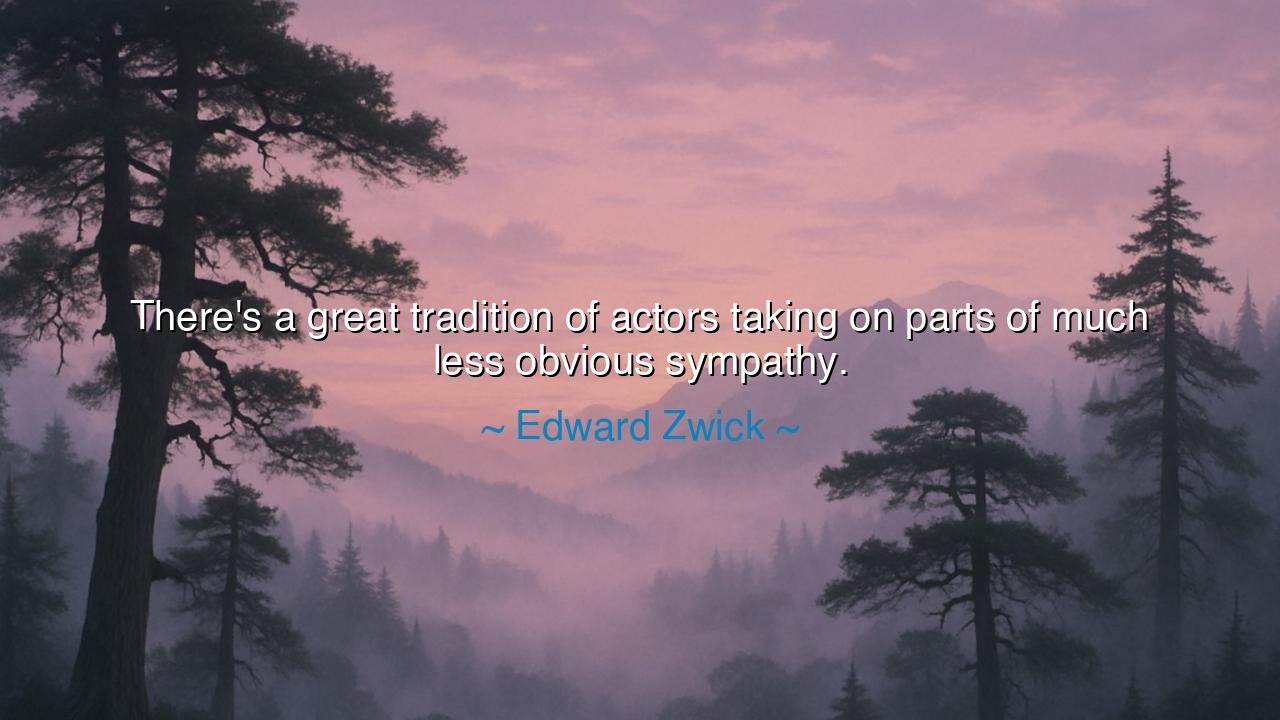
There's a great tradition of actors taking on parts of much less






Hear, O seekers of art and truth, the words of Edward Zwick, who once declared: “There’s a great tradition of actors taking on parts of much less obvious sympathy.” In this utterance he reveals a timeless lesson: that the stage and the screen do not only belong to heroes shining with virtue, but also to figures broken, flawed, and difficult to love. For the task of the actor is not merely to embody what the world admires, but to breathe life into that which the world condemns, so that hidden depths may be revealed.
The meaning is thus: true art does not confine itself to obvious sympathy. The easy path is to portray the noble warrior, the devoted lover, the selfless saint. But the harder, more courageous path is to portray the coward, the betrayer, the tyrant, the soul mired in weakness or cruelty. By doing so, actors do not excuse evil, but show us its human face, reminding us that even the monstrous was once mortal, and that within every villain lies the shadow of choices not unlike our own.
The ancients themselves knew this tradition. In the tragedies of Sophocles and Euripides, the stage was often filled not with gentle heroes but with figures whose actions horrified. Medea, who slew her children; Oedipus, who fulfilled a cursed prophecy; Ajax, who fell upon his sword in madness. To watch these characters was to confront the uncomfortable truth that humanity’s flaws are as worthy of study as its virtues. Actors who stepped into such roles carried the heavy burden of revealing not only what inspires us, but also what warns us.
History too offers examples in the work of Shakespeare. Who can forget Richard III, the deformed schemer whose hunger for power destroyed all in his path? Or Macbeth, who, driven by ambition, murdered his king and damned his soul? These men are not easily pitied, yet audiences across centuries have been compelled by them. The actors who dare to embody such roles continue the tradition Zwick speaks of: they step into the darkest chambers of the human heart, so that others might see, understand, and perhaps learn.
The wisdom here is profound: to confront what is difficult is necessary for growth. Just as the actor must embrace roles of less obvious sympathy, so must we, in life, be willing to face the people, the situations, and even the truths within ourselves that are not easily loved. For only by acknowledging these shadows can we understand the whole of humanity. To deny them is to live with illusions; to face them is to walk the harder road toward wisdom.
The lesson, then, is this: do not turn away from the flawed or the difficult. Whether in art, in life, or in your own heart, dare to look upon what is not easily sympathetic. Learn from the failures of others as much as from their triumphs. When you meet someone whose actions repel you, seek first to understand before you judge. This does not mean excusing wrong, but grasping the conditions, the fears, and the flaws that shaped them. For understanding is the soil from which both compassion and justice may grow.
What, then, should you do? In your work, in your learning, in your daily life, practice the discipline of looking beneath the surface. When you read or watch a story, do not cling only to the noble hero; pay attention also to the broken soul, the difficult figure, the flawed character. When you reflect on your own journey, do not hide your weaknesses, but study them, as an actor studies the unsympathetic role, so that you may transform them into strength.
Thus let Edward Zwick’s words echo as a teaching: “There’s a great tradition of actors taking on parts of much less obvious sympathy.” For this tradition is not only the duty of actors, but of all humankind. We must dare to face what is not easy, what is not lovable, what is not sympathetic—both in others and in ourselves. Only then do we see the full truth of what it means to be human, and only then can wisdom ripen like fruit in the sun.






AAdministratorAdministrator
Welcome, honored guests. Please leave a comment, we will respond soon